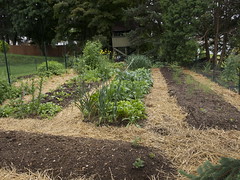 Image by VeggieGardeningTips via Flickrraised gardens. The choice is ultimately yours but I will try to point out some of the pros and cons of this type of garden so that you may decide for yourself.
Image by VeggieGardeningTips via Flickrraised gardens. The choice is ultimately yours but I will try to point out some of the pros and cons of this type of garden so that you may decide for yourself.Soil compaction: Plants love to breathe and that is often difficult when placed in traditional garden rows, as we have quite a bit of difficulty avoiding the possibility of stepping onto the tilled rows in which we have planted our fruits, vegetables, or plants. By using a raised garden, which is designed to be worked from without rather than within, there is little fear of compacting the soil around the plants. At the same time many lifelong gardeners feel the inability to walk around in their gardens is a disadvantage in itself and prefer to be able to do so. This is often a matter of preference rather than practicality but a valid opposition just the same.
Numbers: You can actually plant more plants in the same amount of square footage in a raised bed because there is no need for rows. You should also be aware that plants in raised beds often tend to grow larger than plants in traditional garden rows. That being said you should resist the urge to over plant within the raised garden bed, as this will eliminate that slight benefit. (For some helpful tips on this, see info on Square Foot Gardening
Watering and Drainage: One huge benefit to raised beds for summer gardens in areas that are nearly saturated with excess moisture is that raised beds allow much better drainage than traditional row gardening. This is one thing that the average gardener will not argue with unless he lives in an area in which this isn't much of a problem. Most gardeners in the south though, where there is a great deal of humidity and moisture will agree that proper drainage is a problem.
 Image via WikipediaMobility/Tending To Your Garden: Raised beds are less back-breaking. This is a huge benefit to those of us who are feeling the years creeping into our bones. By being above ground, raised gardens offer easier access for planting, weeding, planting, and investigating for signs of pests. Another great thing about raised gardens is that they warm more quickly, which renders them more productive and with longer growing seasons than most gardens that are placed in the ground.
Image via WikipediaMobility/Tending To Your Garden: Raised beds are less back-breaking. This is a huge benefit to those of us who are feeling the years creeping into our bones. By being above ground, raised gardens offer easier access for planting, weeding, planting, and investigating for signs of pests. Another great thing about raised gardens is that they warm more quickly, which renders them more productive and with longer growing seasons than most gardens that are placed in the ground.Also, for those who have unusually shaped yards or growing areas, raised gardens allow the opportunity to have a beautiful summer garden in almost any shape you can build the box for. This means you are not limited to rows, as many gardens tend to be and that you have a few more options for aesthetics when planning and growing your summer garden.
The downside to raised gardens is that they are difficult to dismantle and nearly impossible to till. This means you must do all the working of the soil by hand and many gardeners do not fully appreciate the beauty of that process. The most important thing however, is that you choose a summer garden system that works for you.
You can do a traditional raised-bed garden, or try an alternative method such as straw-bale or Square Foot Gardening - either way you can reap the benefits of this unique gardening technique.
Raised Bed Gardening Resources:
No comments:
Post a Comment